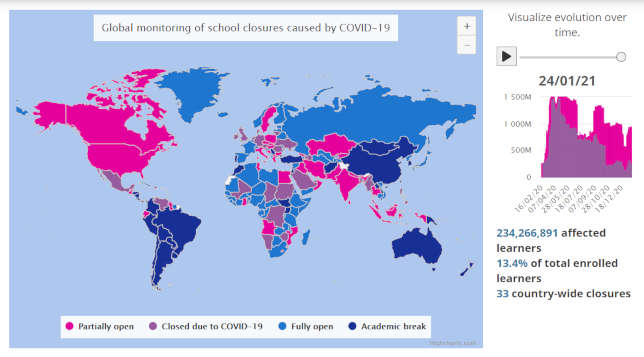UNESCO Promotes Safe Reopening of Schools; Putting Teachers Up Front for Vaccines
- By Dian Schaffhauser
- 02/01/21
UNESCO,
the United Nations agency responsible for education, and Education
International, the global federation of education
unions, has made a plea for schools worldwide to reopen "safely"
and to keep them open "as long as possible." That would
require that teachers and others working in schools be considered
part of a "priority 1" group for vaccines. The comments
came during By UNESCO's recent International
Day of Education, which took place online.
According to
tracking by UNESCO, at least half of the world's student
population--more than 800 million students--are continuing to face
disruptions in their studies. Schools are fully closed in 31
countries and reduced to part-time schedules in another 48 countries.
Those continued closures in response to COVID-19 are generating a
learning loss of about two-thirds of an academic year, on average,
the agency estimated, even taking into account delivery of virtual
learning.

An interactive
map with daily updates on the UNESCO website showed
that schools have been fully closed for an average of 14 weeks since
the beginning of the current pandemic, and that rose to 22 weeks when
taking into account localized school closures. At its height, 190
countries had undergone country-wide closures; now schools are fully
open in 101 countries.
"Prolonged and
repeated closures of educational institutions are taking a rising
psycho-social toll on students, increasing learning losses and the
risk of dropping out, disproportionately impacting the most
vulnerable," said Audrey Azoulay, director-general of UNESCO, in
a statement. "Full school closures must therefore be a last
resort and reopening them safely a priority."
In a video, David
Edwards, general secretary of Education International, emphasized
that "schools are irreplaceable. Reopening schools and education
institutions safely and keeping them open as long as possible is an
imperative."
"In this
context, as we see positive developments regarding vaccination, we
believe that teachers and education support personnel must be
considered a priority group," Azoulay added in that same video.
The number of people in that priority group, according to a UNESCO
count, was about 100 million.
Azoulay also urged
world leaders to commit to financial recovery packages "to
reopen schools safely, targeting those most in need and setting
education back on track for the COVID-19 generation."
Worldwide, education
has received less than one percent (0.78 percent) of relief funding,
according to UNESCO
data published in 2020. Aid to education was on target
to decline by 12 percent as a result of the economic fallout of the
pandemic, the agency stated. UNESCO researchers have suggested that
upfront investment in catch-up and remedial programs would "save
money down the line" by as much as 75 percent by reducing the
expense of repairing the damage caused by COVID-19.
About the Author
Dian Schaffhauser is a former senior contributing editor for 1105 Media's education publications THE Journal, Campus Technology and Spaces4Learning.